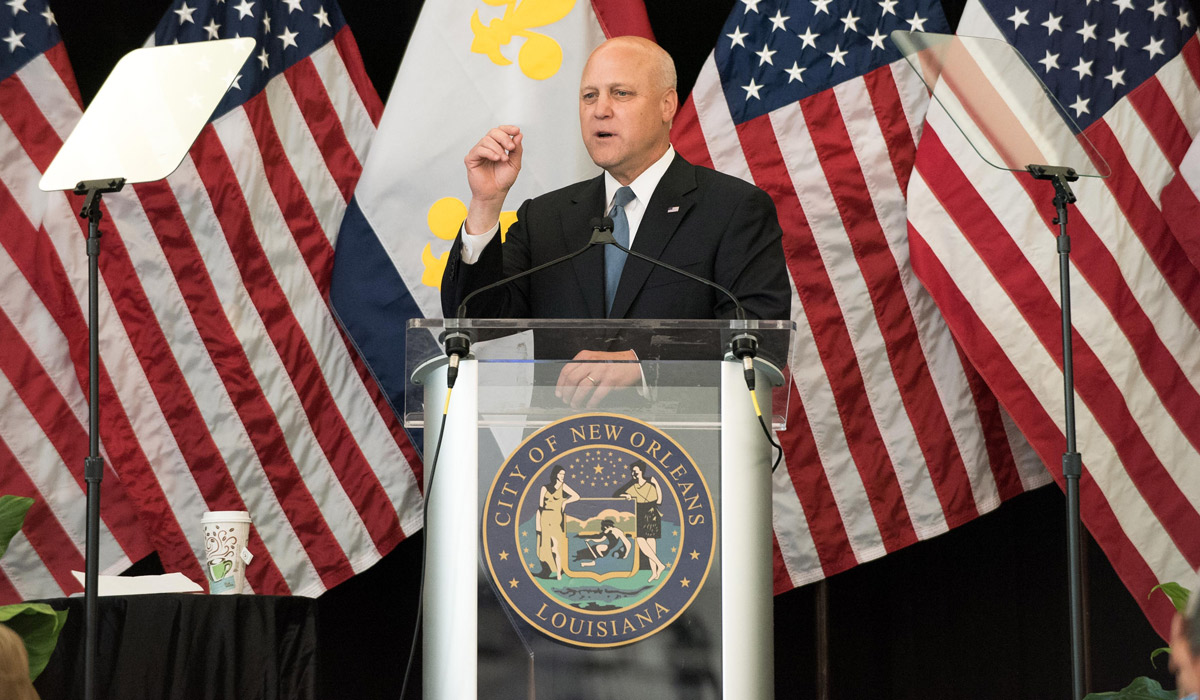

Photo courtesy of New Orleans Office of the Mayor
On May 19, New Orleans Mayor and Catholic University alumnus Mitch Landrieu, B.A. 1982, gave a notable speech on the removal of four city monuments celebrating the Confederacy. Addressing America’s troubled racial history, Landrieu challenged listeners to imagine explaining to a young African-American girl why her city honored the leaders of a slave-holding society. “Do these monuments help her see a future with limitless potential? Have you ever thought that if her potential is limited, yours and mine are too?”
Though the mayor’s plans to remove the statues from public land met with some opposition, his speech was widely reprinted, shared on social media, and praised in the national press. The Chicago Tribune called it “one of the great modern speeches on history and race in America,” and The New York Times praised Landrieu for “putting some poetry back in public life.” Given the national attention garnered by the words of this Catholic University alumnus and the continued timeliness of this topic, we asked two faculty members to comment on the speech and its significance.
Read the official transcript of Landrieu's speech
Stephen West teaches in the Department of History. His areas of specialization are the Civil War, Reconstruction, and the American South.
Mayor Mitch Landrieu’s speech has won him a lot of attention and praise, and rightly so. It’s thoughtful, nuanced, and historically informed — one of the most insightful statements I’ve read from a politician in a very long time.
Mayor Landrieu reminds us that such monuments are an exercise of power and a public choice about whom and what to commemorate. And he emphasizes that removing these memorials isn’t about erasing history but about confronting it — the history of the Civil War and Reconstruction, and just as importantly, the history of the racist Jim Crow era of the late 19th and early 20th centuries, when these monuments were erected. Mayor Landrieu makes a compelling case for what these monuments meant more than 100 years ago, and what they mean to New Orleanians and Americans today.
As a historian, I’m impressed too with how Mayor Landrieu sounds historically resonant notes in making his case. He appeals to the deeply American notion of unity embodied in the motto “E pluribus unum” (“Out of many, one”) and he invokes the call for charity and healing in Abraham Lincoln’s Second Inaugural Address, probably the single greatest speech in our national canon. But the mayor understands that these goals can’t be achieved by forgetting or fudging the history that created divisions and caused wounds in the first place.
Stephen McKenna teaches rhetoric in the Department of Media and Communication Studies. He is the author of Adam Smith: The Rhetoric of Propriety, and co-editor of The World’s Great Speeches.
A great speech doesn’t merely address the moment, but makes it new. Mitch Landrieu’s speech was such an instance of eloquence. His unveiling of New Orleans’s past is history told from the point of view of its innocent victims. America is at its most exceptional when it owns the truth of that history, as in the mayor’s rhetorical question: “Why are there no slave ship monuments, no prominent markers on public land to remember the lynchings or the slave blocks …?”
Landrieu refused to fill that monumental void with scapegoating accusations against those who make a cult of partial history. Instead he sought “to gently peel [their] hands from the grip on a false narrative … and make straight a wrong turn we made many years ago.” If we hear an echo of John the Baptist proclaiming again the Lord’s promise to Isaiah to “make the crooked straight,” it is because this is an eminently Judeo-Christian historiography, courageously confessing painful truth in a moment when “alternative facts” have been seemingly granted a life of their own. It takes courage, too, to end a speech quoting the most sacred text of our political gospel, Lincoln’s Second Inaugural: “With malice toward none, with charity for all ….” But Landrieu’s eloquence makes us hear it anew, so that rather than either self-righteously applaud or grudgingly acquiesce to the removal of such statues, we might embrace the hard work of changing ourselves.